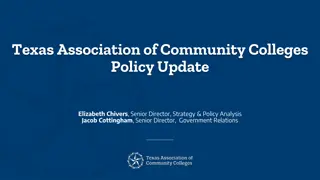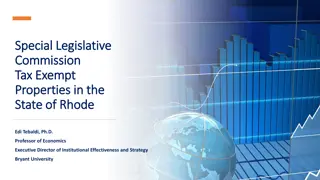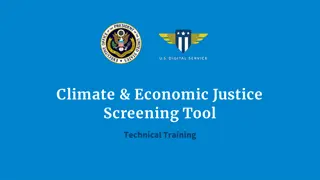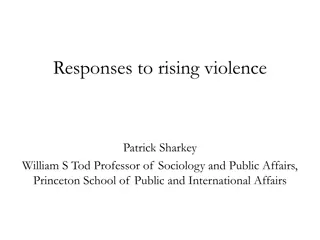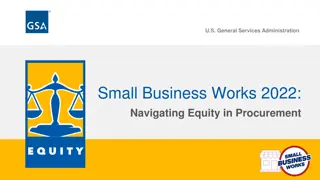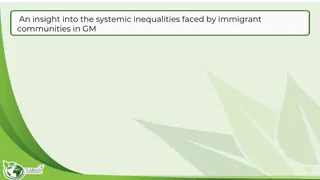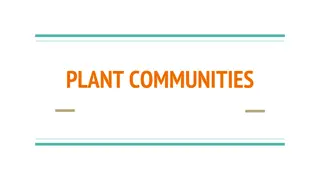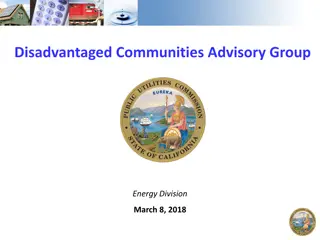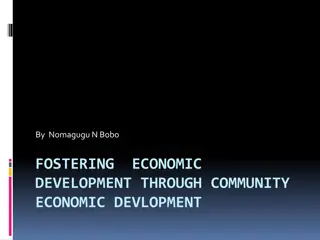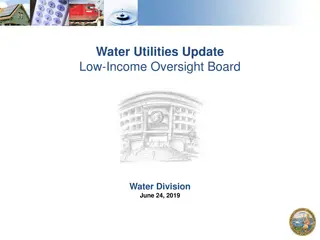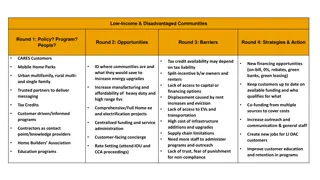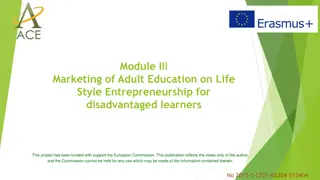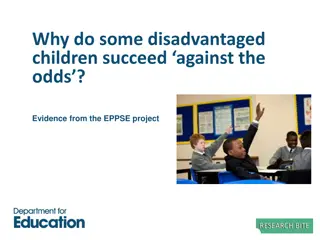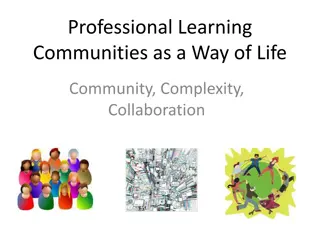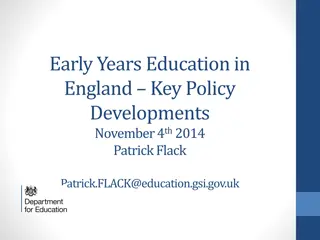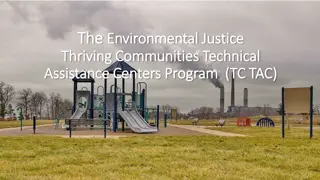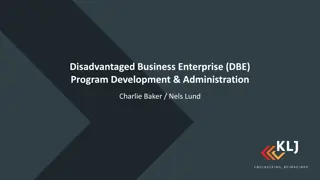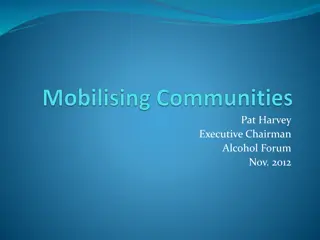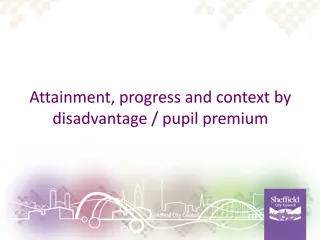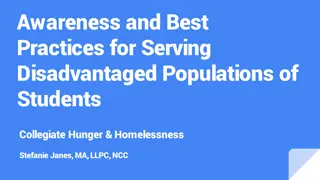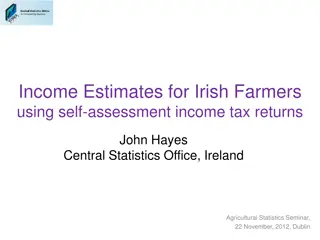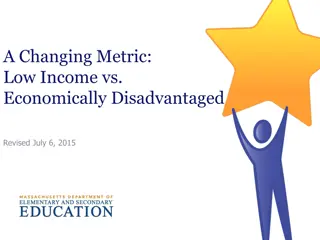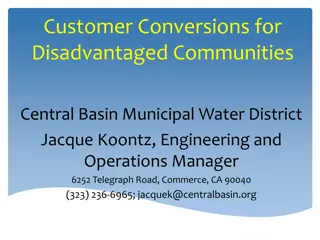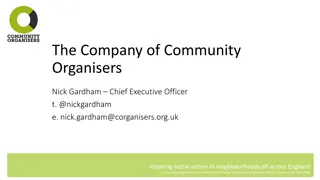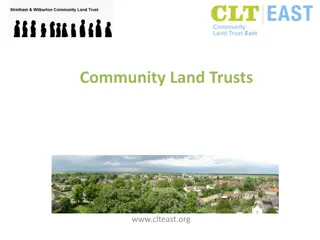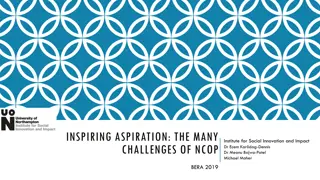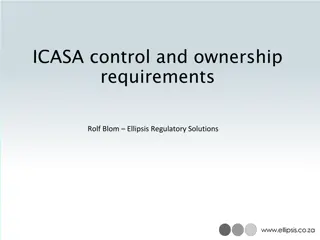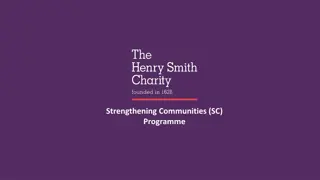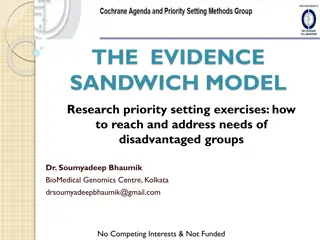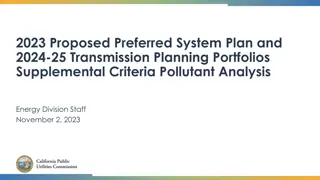Historic Investments in Climate Action: Inflation Reduction Act May 2023
The Inflation Reduction Act (IRA) of May 2023 focuses on making significant investments in climate action to reduce U.S. emissions by an estimated 40% by 2030. This act supports disadvantaged communities, the clean energy industry, and aims to drive emissions reductions over the next decade while pa
5 views • 14 slides
Overview of U.S. General Services Administration's Office of Small and Disadvantaged Business Utilization (OSDBU)
This overview discusses the role of the Office of Small and Disadvantaged Business Utilization (OSDBU) within the U.S. General Services Administration (GSA). It highlights the advocacy for small businesses in federal acquisitions, inclusion of small businesses as contractors, and management of small
3 views • 51 slides
Office of Partnerships and Public Engagement Overview
The Office of Partnerships and Public Engagement, led by Dr. Lisa R. Ramírez, focuses on developing partnerships to address challenges in rural and underserved communities in the U.S. It connects communities with resources from the U.S. Department of Agriculture to promote solutions and provide sup
2 views • 17 slides
Enhancing Equity in Procurement: Strategies and Initiatives
Explore the importance of equity in procurement through initiatives like M-22-03 and EO 13985. Discover how federal agencies are striving to increase equitable outcomes by supporting underserved communities and small disadvantaged businesses. Learn about key definitions like New Entrant and Recent E
1 views • 18 slides
Climate Justice & Disadvantaged Communities: Environmental Issues in US EPA Region 2
Climate justice and the impact on disadvantaged communities are key environmental issues addressed by Adriana Espinoza, Deputy Commissioner for Equity & Justice in US EPA Region 2. The initiative identifies and prioritizes disadvantaged communities based on multiple criteria, including environmental
5 views • 18 slides
Overview of the Inflation Reduction Act of 2022: FHWA Programs
The Inflation Reduction Act of 2022 (IRA) establishes various programs administered by the Federal Highway Administration (FHWA) aimed at enhancing neighborhood access and equity, implementing environmental reviews, and supporting low-carbon transportation materials grants. With over $5 billion allo
1 views • 10 slides
BELA SUBMISSION.
Advocating for language inclusivity in South African education, the National Governors Association represents marginalized communities historically disadvantaged by apartheid policies. Supporting proposed amendments to the South African Schools Act, the NGA emphasizes the right to education in langu
1 views • 20 slides
Understanding Communities: Characteristics, Interactions, and Differences from Society
Communities are groups of people with shared characteristics and goals, fostering a sense of belonging and mutual support. They thrive on social interactions, diversity, and interdependence. Contrasted with society, where diverse communities coexist, communities have a more concrete existence and lo
6 views • 6 slides
Texas Association of Community Colleges Policy Update Overview
This update highlights key components of House Bill 8 focusing on financial aid for Swift Transfer, shared services, performance tier, base tier, and the Community College Standing Advisory Committee. It also discusses the state's investment in community colleges, the HB 8 funding model, and the tra
0 views • 18 slides
Impact of Nonprofits in Rhode Island: A Comprehensive Overview
Nonprofits play a crucial role in Rhode Island, contributing significantly to the economy, job creation, and community development. They attract and retain disadvantaged communities, support the arts, provide essential services, drive economic growth, and enhance cultural awareness. In 2021, nonprof
0 views • 14 slides
Climate & Economic Justice Screening Tool Technical Training
This technical training focuses on the Climate & Economic Justice Screening Tool (CEJST) beta version, demonstrating its functionality, providing technical information, and explaining feedback methods. Developed in response to Executive Order 14008, this tool aims to identify disadvantaged communiti
2 views • 8 slides
Understanding Responses to Rising Violence Trends in the United States
Patrick Sharkey, a professor of Sociology, analyzes the historical trends of violence in the United States, highlighting peaks and declines over the decades. The data from 1960 to 2020 reveal spikes in violence during the 1960s and early 1990s, followed by a downward trend until the mid-2010s. Howev
0 views • 19 slides
Understanding the 8(a) Business Development Program and Equity in Procurement
The 8(a) Business Development Program, created by the U.S. Small Business Administration, aims to assist socially and economically disadvantaged small businesses in developing and growing. This program provides opportunities for small companies to secure federal contracts and procurement. The progra
2 views • 31 slides
Systemic Inequalities Faced by Immigrant Communities in Greater Manchester
Gain insight into the systemic inequalities faced by immigrant communities in Greater Manchester, including definitions of refugees and asylum seekers, a snapshot of refugee and migrant communities in Manchester, the Iranian diaspora in the UK, global migrant statistics, and common health issues fac
0 views • 10 slides
Understanding Plant Communities: Definition, Characteristics, and Succession
Plant communities are naturally occurring groups of plant and animal populations living in a common environment. They consist of various qualitative and quantitative characteristics such as floristic composition, vitality, density, cover, abundance, frequency, and more. Ecotones and edge effects pla
2 views • 8 slides
Exploring International Library and Cultural Exchange Initiatives
This presentation discusses the efforts of the International Library and Cultural Exchange Interest Group in promoting cultural understanding and collaboration through library partnerships and activities. The group offers grants to support projects that connect libraries in Colorado with those in ot
0 views • 12 slides
Disadvantaged Communities Advisory Group - SB 350 Related Programs and Appointments
The Disadvantaged Communities Advisory Group focuses on the implementation of SB 350 and related programs to benefit disadvantaged communities. The group prioritizes access to clean energy technologies, affordability of energy services, and maximizing economic and environmental improvements. Appoint
0 views • 11 slides
Fostering Economic Development Through Community Economic Development
Community Economic Development (CED) involves local actions to create economic opportunities improving social conditions, especially for the disadvantaged. It recognizes the interdependence of economic, environmental, and social challenges, emphasizing solutions rooted in local knowledge. The ultima
1 views • 30 slides
Water Utilities Update and Low-Income Oversight Board Summary Report
This report covers various topics such as low-income assistance, school lead testing, water rate design, school lead testing legislation, water production reports, and proposed funding for safe and affordable water. It also discusses acquisitions of smaller water systems and the benefits of consolid
0 views • 9 slides
Energy Efficiency and Support for Low-Income Communities
The discussion highlights challenges and strategies for implementing energy efficiency programs in low-income and disadvantaged communities. It addresses barriers like lack of access to capital, displacement, and mistrust, while proposing solutions such as new financing opportunities, customer-drive
0 views • 4 slides
Marketing Strategies for Adult Education in Entrepreneurship
This project focuses on developing marketing competences for adult educators to engage disadvantaged learners in lifelong learning and entrepreneurship training. The aim is to empower learners through effective marketing strategies and communication channels, highlighting the social and psychologica
0 views • 39 slides
Understanding How Disadvantaged Children Succeed: Insights from the EPPSE Project
Disadvantaged children often face challenges in education, but some manage to succeed against the odds. The Effective Pre-School, Primary, and Secondary Education (EPPSE) Project sheds light on the factors contributing to their success. Parents play a crucial role by actively engaging their children
0 views • 12 slides
Understanding Professional Learning Communities in Education
Professional Learning Communities (PLCs) are essential in education for fostering collaboration, sharing knowledge, and improving teaching practices. This article explores the benefits of PLCs, types of communities, research on learning communities, and the formation of teacher professional communit
0 views • 14 slides
Key Policy Developments in Early Years Education - England 2014
The early years education landscape in England underwent significant changes in 2014, focusing on providing entitlements for three- and four-year-olds, with recent extensions for two-year-olds. The government aimed to support school readiness and parental labor market access through various interven
0 views • 9 slides
Environmental Justice Thriving Communities Technical Assistance Program Overview
The Environmental Justice Thriving Communities Technical Assistance Centers Program (TC TAC) provides $2.8 billion for financial assistance, with a focus on benefiting disadvantaged communities through pollution remediation, workforce development, climate adaptation, and more. Grants must be impleme
0 views • 15 slides
Developing and Administering a DBE Program for Small Businesses
The Disadvantaged Business Enterprise (DBE) Program aims to support small businesses owned by socially and economically disadvantaged individuals. These individuals belong to various groups such as Black Americans, Hispanic Americans, Native Americans, Asian-Pacific Americans, Subcontinent Asian Ame
1 views • 16 slides
Mobilising Communities for Positive Impact: A Call to Action
Explore the journey of Pat Harvey and The Prompt in spearheading initiatives to mobilize communities for positive change. From tackling issues related to alcohol to fostering alignment and synergy across agencies and communities, the focus is on research, fine-tuning strategies, and implementing evi
0 views • 8 slides
Improving Attainment and Progress of Disadvantaged Pupils in Sheffield
Attainment and progress of disadvantaged pupils in Sheffield show an improving trend across key stages, although the gaps between disadvantaged and non-disadvantaged students are not closing fast enough. Data suggests that disadvantaged pupils with low prior attainment are making better progress in
0 views • 29 slides
Understanding Collegiate Hunger and Homelessness Among Disadvantaged Student Populations
This collection of resources sheds light on the challenges faced by disadvantaged students in terms of collegiate hunger and homelessness. It discusses the myth of meritocracy, the importance of self-awareness, and presents insights from the "Hunger on Campus Report," highlighting food security leve
0 views • 16 slides
Baobab Winter Donation Drive - Spreading Warmth to Needy Communities
Baobab Networking Center, an NPO established in 2017, focuses on technology awareness, poverty alleviation, and supporting disadvantaged communities. Their upcoming project aims to provide basic resources to underprivileged areas in South Africa, collecting donations in the form of clothing, blanket
0 views • 11 slides
Analysis of Irish Farmer Incomes Based on Income Tax Returns
This paper presents an analysis of Irish farmer incomes in 2010 using self-assessment income tax returns from the Revenue Commissioners. The study focused on various income sources such as trading income, rental income, employment income, social welfare transfers, and pension income. The dataset com
0 views • 12 slides
A Changing Metric: Low Income vs. Economically Disadvantaged
Historical data on low-income students in Massachusetts, collected for various purposes including school nutrition, federal entitlement allocations, and research projects. The introduction of the Community Eligibility Provision (CEP) program in 2011 aimed to provide free meals to qualifying students
0 views • 14 slides
Enhancing Water Accessibility for Disadvantaged Communities through Recycled Water Conversions
Design and installation of recycled water pipeline laterals, conversion of 9 sites in 6 Disadvantaged Community locations, and expansion of recycled water use to benefit communities. Project includes outreach strategies, funding details, and program preferences aimed at reducing groundwater pumping
0 views • 10 slides
The Company of Community Organisers: Inspiring Social Action in England
Community Organisers Ltd., led by Nick Gardham, aims to empower communities across England through collective action. Their work involves building relationships, activating people, and creating social and political change. The organization focuses on listening to community members, unlocking their p
0 views • 23 slides
Community Land Trusts: Empowering Communities through Collective Ownership
Community Land Trusts (CLTs) are legal entities run by local volunteers to collectively own and manage property/land, undertake development projects, and secure assets for the community. With priorities set by communities to address local issues like affordable housing and recreation, CLTs provide a
0 views • 13 slides
Addressing Challenges of Disadvantaged Students Through NCOP Outreach
This research paper delves into the National Collaborative Outreach Programme (NCOP) and its impact on disengaged and disadvantaged students, focusing on parental engagement and wider social issues. Drawing on Bourdieu's cultural capital concept, the study evaluates the effectiveness of NCOP activit
0 views • 16 slides
Understanding ICASA Control and Ownership Requirements
In South Africa, the Independent Communications Authority of South Africa (ICASA) regulates the licensing framework for electronic communications services. ICASA's mandate involves establishing licensing frameworks, promoting ownership by historically disadvantaged groups, and supporting black econo
0 views • 14 slides
Strengthening Communities (SC) Programme Overview
Strengthening Communities (SC) Programme provides grants ranging from 60k to 180k over 3 years to small grassroots charitable organizations in the UK's most deprived areas. Eligible organizations must be located within or next to designated deprived areas. The program aims to support established org
0 views • 14 slides
Evidence Sandwich Model: Addressing Needs of Disadvantaged Groups
In a world of medical advancements, reaching those in resource-poor settings remains a challenge. The Evidence Sandwich Model explores ways to prioritize research, collaborate, and tackle implementation bottlenecks to deliver basic care to disadvantaged populations. Led by Dr. Soumyadeep Bhaumik, th
0 views • 18 slides
Criteria Pollutant Analysis for California's Electric Sector Planning
The analysis focuses on minimizing air pollutants and greenhouse gas emissions, with a priority on disadvantaged communities, as directed by California's Public Utilities Commission. It includes quantifying criteria pollutants within and outside of Disadvantaged Communities (DACs) for the years 2026
0 views • 15 slides








